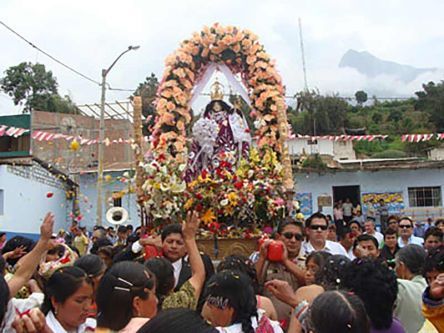Potatoes were domesticated as early as 10,000 years ago in the High Andes of southeastern Peru and northwestern Bolivia. During centuries the Papa developed to be an important staple food and a primary energy source for early Peruvian cultures.
The potato was next to the corn and the quinua one of the three principal staple foods of the Incas and important for feeding the Spanish conquerors. Today you can find over 3800 varieties of potatoes in Peru. They differ in size, shape, color, skin, pulp, texture and of course taste, but all have their place and play a vital role in the Peruvian cuisine.
While everybody agrees that the birthplace of the potato is in South America, the exact place of origin is unknown and reason for the one or other open dispute between Chile and Peru.
The oldest archeological findings were made in the area of Lake Titicaca, the area around Ayacucho and in the Valley of Chulca. The word "papa" is originally Quechua and simply means tuber.
As wild potatoes taste bitter and contain small amounts of toxins, ancient cultures must have spent quite a bit of an effort to select the right tubers for cultivation that are more tasty and less toxic.
It is believed that sailors returning from Peru and other countries in the New World brought potatoes back with them to Spain and England around 1570. But people suspected this botanical novelty, and it took around 100 years until the potato was accepted.
Once established in Europe, the potato soon became an important food staple and field crop. It helped reduce famines in the 17th and 18th century. Despite being first introduced outside the Andes region only four centuries ago, today potatoes have become an integral part of much of the world's cuisine.
Papa Blanca - White Potato
Many different potato varieties are sold under the term Papa Blanca; but be careful, not everything labeled Papa Blanca is a true white potato. Real Papas Blancas are characterized by a light brownish outside and a firm, pale whitish colored flesh. They are great for general cooking and frying, and therefore probably the most consumed potato in Peru. Papas Blancas are used in all Peruvian dishes where the potatoes should stay more or less firm. But don't overcook them, else they get mashy.
Papa Amarilla - Yellow Potato
Under the term Papa Amarilla (Yellow Potato) many different varieties are combined. They have, as the name suggests, a yellow or butter colored flesh in common. Just recently commercialized are, for example, the Amarilla Tumbay grown in the region of Cerro de Pasco, Huanuco, Junin and Lima and the Huagalina cultivated in the regions of Cajamarca, La Libertad, Ancash, Piura and Amazonas. Papas Amarillas grow at an altitude between 2800m and 3800m above sea level.
Yellow Potatoes have to be cooked carefully just to the point, otherwise they burst open and fall apart. Best vapor them for 18 minutes, then they are perfect. Once cooked Papas Amarillas are very soft and grainy. To avoid disasters in the kitchen, don't bake, saute, or use them for potato salad. The Yellow Potato however is perfect for preparing a creamy "pure de papa" (mashed potatoes) or the famous "Causa Limeña". Great as well for thick Peruvian French fries or as an ingredient in Peruvian stews.
Papa Perricholi
Invented only around 30 years ago, Papa Perrichilo, named after the nickname of the Lima based stage actress Michaela Villegas, is a bestseller on Lima's markets. It is like the Papa Blanca (white potato); sweet and watery, ideal for frying. As it doesn't change the color or get brownish after peeling, the Papa Perricholi is often used in commercial kitchens, restaurants and for industrially made French fries.
Papa Peruanita
The Papa Peruanita has a distinctive bi-color skin and an extraordinary flavor. Boiled in salt water and served peeled or even unpeeled with a bit of butter or a light yoghurt-herb-sauce, its extraordinary flavor unfolds best.
Papa Huamantanga / Juito Rojo
For most the Papa Huamantanga, also known as Juito Rojo is the star of the potatoes. Cultivated mostly in the Peruvian Andes in the regions of Huancavelica, Ayacucho, Junin, Apurimac, Cerro de Pasco, Huanuco, Ancash, Cusco and Lima at an altitude between 3700 m and 4700 m above sea level, today it has found its way to all good sorted mercados and supermarkets in Lima.
The flesh of the Papa Huamantanga has the color of a Papa Blanca (white potato) but the texture of a Papa Amarilla (yellow potato). It's best for cream colored mashed potatoes, eaten vapored (12 to 15 minutes is enough) or fried to French fries and is often used in typical stews of the Peruvian highlands.
Papa Tarmeña
The skin of Papas Tarmeñas is very similar to the one of the Papa Peruanita, but the inside isn't yellow, more of a creamy color. Usually this potato is used in the famous Causa Limeña as it makes the potato mass creamy. It's also good baked, roasted or fried and sometimes used in Lomo Saltado.
Papa Canchan
Papa Canchan, also called Papa Rosada (Pink Potato), has a pink, thin skin; the meat is of a pale whitish color like Papas Blancas, therefore probably sometimes sold under this name, but they stay much firmer when cooked and have a better flavor. Papas Canchans find a use in Peruvian stews, soups and the famous Pachamanca. It's also the most common potato variety used for Papa Rellena.
Papa Cóctel - Cocktail Potato
By now the sweet, small Cocktail Potatoes are known around the world. The texture and flavor is like the Papa Blancas (white potatoes), but much more intense. They are great served just boiled or baked, peeled or unpeeled with sauces, but absolute delicious when used for potato salad.
Papa Púrpura - Purple Potato
As the name suggests, the skin and flesh of Papa Púrpura is of a deep purple, when cooked mostly bluish color. Today referred to by some chefs as the "Gem of the Andes", in pre-Hispanic times these potatoes were reserved for the Inca Kings. Purple potatoes can be cooked like any other potato and are very similar in taste to the "normal" ones, probably a little more buttery. They are best if roasted and then cut open, interesting in salads and absolutely delicious deep fried.
Papa Nativa - Native Potato
This potato is sold on Lima's markets under the name of Papa Nativa or Papa Andina even if these names describe several Andean potato varieties. Anyhow, in the last few years Papas Nativas became popular in Peru when a big chips producer started selling naturally bi-color native potato chips.
Papa Huayro
Papas Huayro have a great taste. They are very absorptive and therefore ideal as garnish for dishes with plenty of sauce, for the use in stews and soups where they incorporate the flavor or as an ingredient in Causa, Papa Rellena or mashed potatoes.
Papa Negra - Black Potato
Black Potatoes are also known under the name Papa Mariva or Papa Tomasa Negra. The skin is dark brown to black, the inside yellowish. The Papa Negra is floury, slightly sweet with a pleasant taste, and finds a use in almost all Peruvian dishes: stews, soups, boiled, fried or mashed. It's an ideal potato for Papa Rellena (Peruvian Stuffed Potatoes) as it browns well.
Papa Tomasa
Papa Tomasa, known also as white potatoes, are not widely cultivated in Peru anymore and today can almost only be found in the areas of Huancavelica, Ica and Cañete. The skin is light with purple to black spots and quite tough, the flesh white. Papa Tomasa are often used as an ingredient for one of Peru's most popular soups, the Sancochado and are presumably the best potatoes for Peruvian papas fritas (French fries).
Papa Yungay
Papa Yungay are very similar to Papa Amarilla (yellow potato), but don't go off so quickly. Grown in the Peruvian Andes, they can be stored for an extended period without losing its flavor. Additionally, Papas Yungay have varied uses in the Peruvian kitchen.
Chuño - Freeze-Dried-Potato
Chuño is a freeze-dried potato traditionally made by Quechua and Aymara communities of Peru and Bolivia. The production of Chuño dates back to pre-Inca times. After the harvest mostly small potatoes are selected and spread on flat ground. They are left in the open and freeze at night with the low temperatures of the Andes. At day they are exposed to the sun, trampled on by foot to extract the last remaining water in them and remove the skin. This process is repeated 3 to 5 nights / days.
Once dried Chuño is contrary to fresh potatoes that are vulnerable to mold and rot quickly, easy to store. Kept in the typical permanently frozen underground stores in the Andes, it can be stored for years with no loss of the nutritional value. Chuño and especially Chuño Flour are used in many dishes and dessert of the Andes cuisine.
























































































































